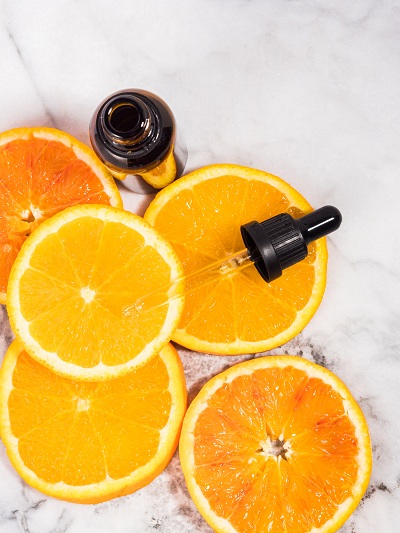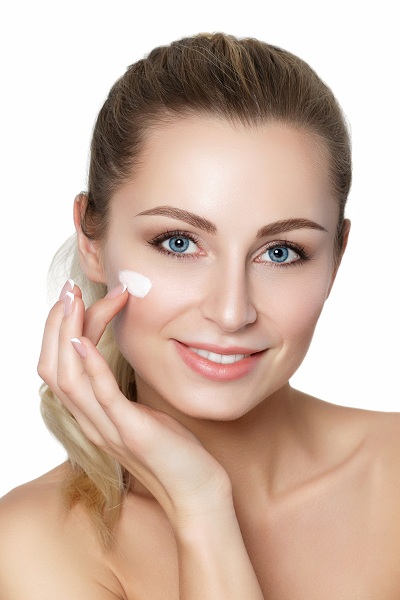Chances are that when you think of citric acid, lemon juice and baking recipes come to mind. It’s an ingredient that has numerous uses in the food industry, yet it’s one that the skincare world also favors.
Take a look at the ingredient lists of some of your favorite cosmetic products and you’ll likely find citric acid listed on several of them.
But what’s citric acid actually doing in your skincare? Is it truly beneficial or is it just another irritating preservative? Turns out, it’s a bit of both…
Contents
What is Citric Acid?
Citric acid is an alpha hydroxy acid that’s extracted from citrus fruits, as well as some berries. It’s the compound that gives citric fruits their characteristic acidic taste.
In addition to being a popular ingredient in skincare products, it’s used as a flavoring and preservative in food and beverages, and it can also be commonly found in household cleaners.
The Benefits of Citric Acid for Your Skin

It may not have the best rep, but citric acid in skin care products can be beneficial in several ways:
Works as an Alpha Hydroxy Acid to Remove Dead Skin Cells
Just like glycolic acid, mandelic acid, and lactic acids, citric acid is classed as an alpha-hydroxy acid.
You’ve probably heard of alpha-hydroxy acids (AHAs) before – they’re a type of chemical exfoliant.
They work by dissolving the glue-like substance that keeps dead skin cells attached to the surface of the skin, allowing all of those dead cells to be washed away.
Its molecular size is what sets citric acid apart from the other AHAs out there. Its molecules are much larger, which means that the skin isn’t able to absorb quite as much of it. As a result, it’s not so powerful, which is why it’s often referred to as a weak acid.
This isn’t necessarily a bad thing – it means that those with sensitive skin, who can’t usually handle other acids, may be able to exfoliate with citric acid without any irritation.
Powerful Antioxidant Properties
Free radicals wreak havoc on the skin. They destroy proteins, alter skin cell DNA, trigger premature skin aging, and more. You can’t really avoid them, since there are so many external aggressors out there, from UV rays to pollution.
The only way to repair and protect against free radical damage is with the use of antioxidants, and citric acid is known for its potent antioxidant properties [1].
Brightens Dark Spots and Evens Out the Skin Tone
Most of the DIY skincare recipes out there that aim to brighten the skin contain lemon juice, and this is all because of its citric acid content. One of the effects of citric acid is skin lightening, making it a great ingredient for tackling dark spots and hyperpigmentation.
Use the right citric acid skincare products and you could be well on your way to a bright and even skin tone.

Reduces and Prevents Fine Lines and Wrinkles
As mentioned, citric acid functions as an antioxidant. This means that, in addition to fighting free radicals, citric acid helps to boost collagen production too.
Collagen is one of your skin’s main structural proteins. Your skin produces plenty of this while it’s young, but production rapidly declines with age, leading to wrinkles.
By speeding this back up, citric acid can help to give your skin a smoother, firmer, and bouncier appearance.
Astringent Properties
Citric acid works as an astringent [2], which is why you’ll find it in so many cleanser and toner cosmetic formulations. This simply means that it’s able to clear away excess oil from the skin, making it beneficial for those with oily, acne-prone skin.
Acts as a pH Adjuster
As you can imagine, citric acid has a very acidic pH – its pH levels usually sit at around 2. In comparison, the skin’s pH should ideally be somewhere around 5.5.
However, due to most skincare products sitting on the alkaline end of the scale, the skin’s pH is often out of balance, which interferes with normal skin barrier function. As a result, a number of issues can arise, from constant skin irritation to acne breakouts.
Using an acidic ingredient like citric acid can help to lower the alkalinity of your skin, bringing its pH back down to ideal levels.
This is why many skincare products that contain alkaline ingredients will also be formulated with citric acid – it helps to adjust the pH of those skincare formulations, preventing them from harming your skin.

However, there’s also a DIY option. If you would like to adjust the pH of your skincare yourself, citric acid is also available pure in powder form. You can mix this into some of the products in your skincare routine to achieve a low pH.
However, unless you really know what you’re doing, we wouldn’t recommend this – read on to learn more about what happens if you use incorrect concentrations of the ingredient.
Is Citric Acid Safe for Your Skin?
Now onto the question that everybody has – how safe is acidic acid? Many say that it causes irritation, dryness, and a stinging sensation, but, to be fair, so can many of the other exfoliating acids out there.
Higher concentrations will cause more irritation, but most of the skincare products out there that contain the ingredient only use it in very small amounts.
Other than extremely sensitive skin, citric acid is safe to be used on all skin types, and this is something that has been confirmed by the Cosmetic Ingredient Review panel [3].
How to Add Citric Acid to Your Skincare Routine
While you could buy citric acid in its pure form and add it into your skincare products yourself, we wouldn’t recommend going down this route unless you really know what you’re doing. Get the concentration wrong and you could end up with some serious skin sensitivities.
Instead, trust in the experts. Look for products containing citric acid that target your primary skin concerns. For example, a toner with citric acid and salicylic acid could help with prominent pores, while a serum containing citric acid, kojic acid, and alpha-arbutin would be ideal for age spots.
On the other hand, look for citric acid in a thick and nourishing moisturizer if you’d like to reduce signs of aging or treat dry patches. Go for a lower concentration to start with – you can always choose something stronger in the future if your skin tolerates the ingredient well.
Whichever type of product you choose, don’t be too eager to start using it. Just like other acids, citric acid should be introduced into your skincare routine at a very gradual rate. Start by using the ingredient just a couple of times a week at first (after performing a patch test, of course), before slowly building this up.
No matter your skin type, this will really help to save you from potential side effects.
One final tip: if you’re using citric acid products in the morning, make sure that you’re extra diligent about sun protection. Just like all other exfoliants, citric acid leaves the skin more susceptible to sun damage, making SPF a must.

FAQs
Is citric acid bad in skin care?
When it comes to skincare products, citric acid is a very beneficial ingredient.
The only exception would be if you have very sensitive skin – citric acid could be too irritating.
Is citric acid good for your skin?
Yes, there are so many benefits of citric acid for your skin – it’s a great ingredient to use! This is why you’ll find it in so many cosmetics.
Is citric acid an AHA or BHA?
Yes, citric acid is classed as an AHA.
Does citric acid dry out the skin?
When used in appropriate quantities, then no, citric acid won’t dry out the skin. However, if you over-use the ingredient, then yes, dryness will likely be one of the side effects.
Conclusion
As you can see, the benefits of citric acid are vast. Even better, it’s an ingredient that can be safely used on most skin types. If you’ve previously shied away from products containing citric acid, feel free to start doing the opposite!
This exfoliating acid may not be as famous as some of the others out there (we’re looking at you, glycolic acid and lactic acid), but it’s just as worthy in its own right.
References
[1] https://www.sciencedirect.com/science/article/pii/S0731708518320582
[2] https://pubmed.ncbi.nlm.nih.gov/8866103/
[3] http://www.cir-safety.org/sites/default/files/citric032012FR.pdf